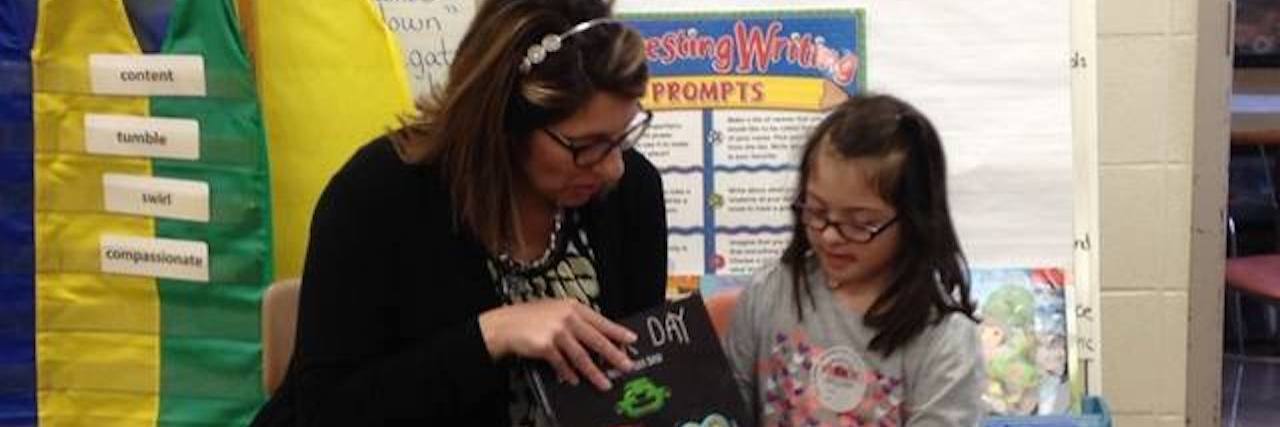Hey Alabama State Board of Education, Children With Disabilities Belong in the Classroom
Sometimes the news isn’t as straightforward as it’s made to seem. Ellen Stumbo, The Mighty’s Parenting Editor, explains what to keep in mind if you see this topic or similar stories in your newsfeed. This is The Mighty Takeaway.
As a parent of two children with disabilities, I am tired. Tired of having to explain to people why my daughter with Down syndrome deserves to be alive. And now, tired of having to argue that my children belong in the classroom.
Video of a school board meeting featuring Alabama State Board of Education (SBOE) board member, Ella Bell, took the parenting community by storm on Thursday. In the video, Bell asks if children with disabilities could be removed from their schools and placed in a separate “academy.”
“Is it against the law for us to establish perhaps an academy on special education or something on that order, so that our scores that already are not that good would not be further cut down by special-ed’s test scores involved,” she asked, as if taking away education from children with disabilities is an acceptable solution to Alabama’s “not that good” test scores.
Since the video began circulating, more than 62,000 parents have signed a petition to have Ella Bell removed from the board.
What’s concerning to these petition-signing parents and myself is that a school board member did not seem knowledgable of special education laws and believed children with disabilities should be segregated rather than included in a classroom.
I thought that was a battle fought in the 70s, but here we are again.
The Alabama SBOE’s conversation should center around the problems and flaws in testing, not in denying children their right to a free and appropriate education in the least restrictive environment (LRE) per the Individuals with Disabilities Education Act (IDEA).
Segregation of children with disabilities is the most restrictive environment.
Even though my kids don’t go to school in Alabama, it is hard not to take these conversations personally. I have had conversations with other people who express concern that kids with disabilities will be disruptive in the classroom or “hold the kids back” from learning. These comments come from people who clearly do not understand the purpose of an individualized education plan (IEP) and who are unaware of supports provided for children with disabilities.
So let’s tackle those myths:
1) Children with disabilities will disrupt the classroom.
Yes, some children with disabilities can be disruptive (as can all kids). However, most kids with disruptive behaviors have built in supports to help if and when necessary.
Also, that is a gross overgeneralization that labels all children with disabilities as “disruptive.” Many kids with disabilities are well-mannered and well-behaved, and are not the kids causing disruptions in the classrooms.
2) Kids with disabilities will “hold back” the typical children from learning.
Most kids with disabilities have an IEP stating their individual and specific academic goals. So while little Suzy and the rest of the class learn multiplication, a special education teacher is working with my child on simple addition. Class proceeds as usual, my child isn’t “holding back” anyone. That’s the purpose of an IEP, it allows students with disabilities to learn at their own pace.
Research shows an inclusive education not only benefits children with disabilities, it helps their typical peers as well. When parents of children with disabilities push for inclusion, it’s because we know it can work for all kids in the classroom, and because our children have the right to an education.
Our children’s education is something we as parents fight for every day, and will continue to do. Comments suggesting we separate our children in order to “better” test scores are not only offensive, they ignore the complexities of special education.
At the end of last school year, both the regular education and special education teacher walked my daughter with Down syndrome to our car. They both cried as they said goodbye to my daughter, knowing it would be our last year in the school. I am confident both teachers would list the many ways in which she contributed to the classroom and how she made the learning environment better for all.
Our children with disabilities have the same humanity as typical children. They have a right to an education and as parents, we will fight for their place in the classroom.

